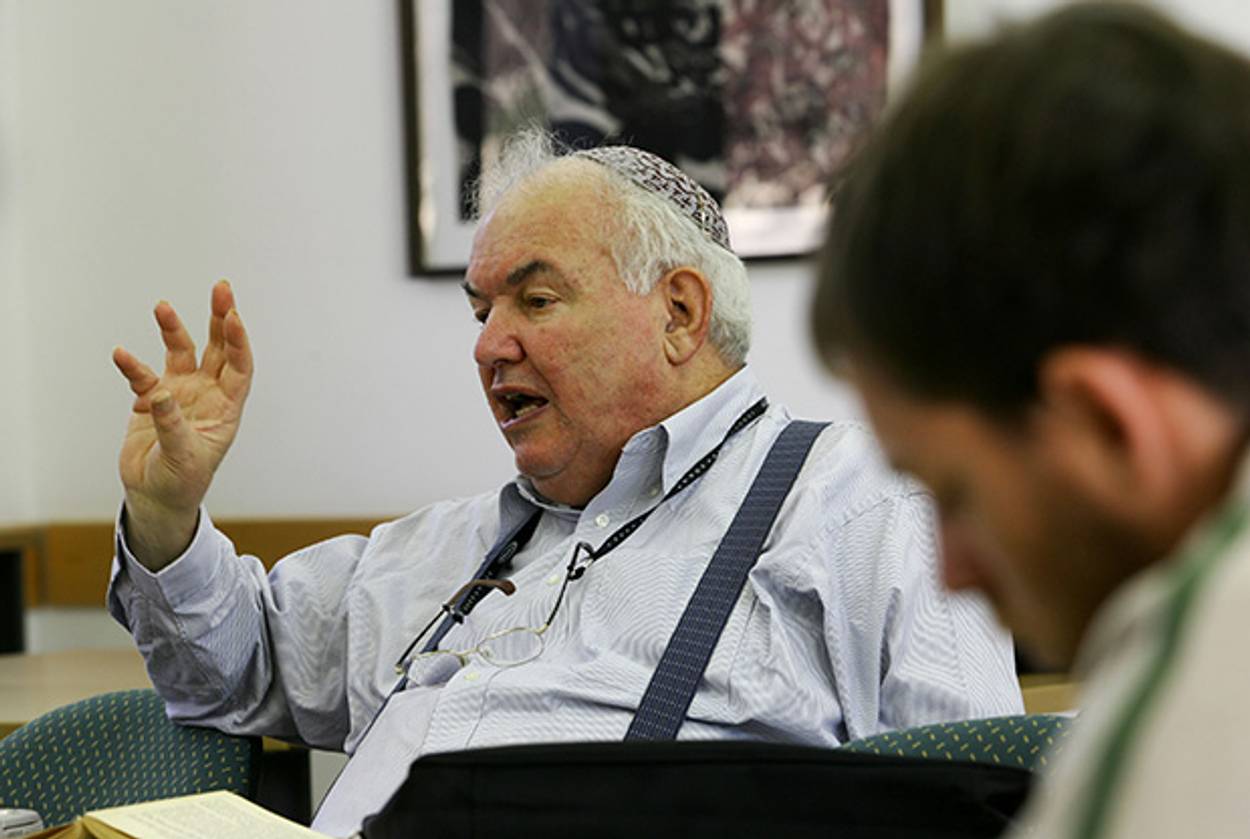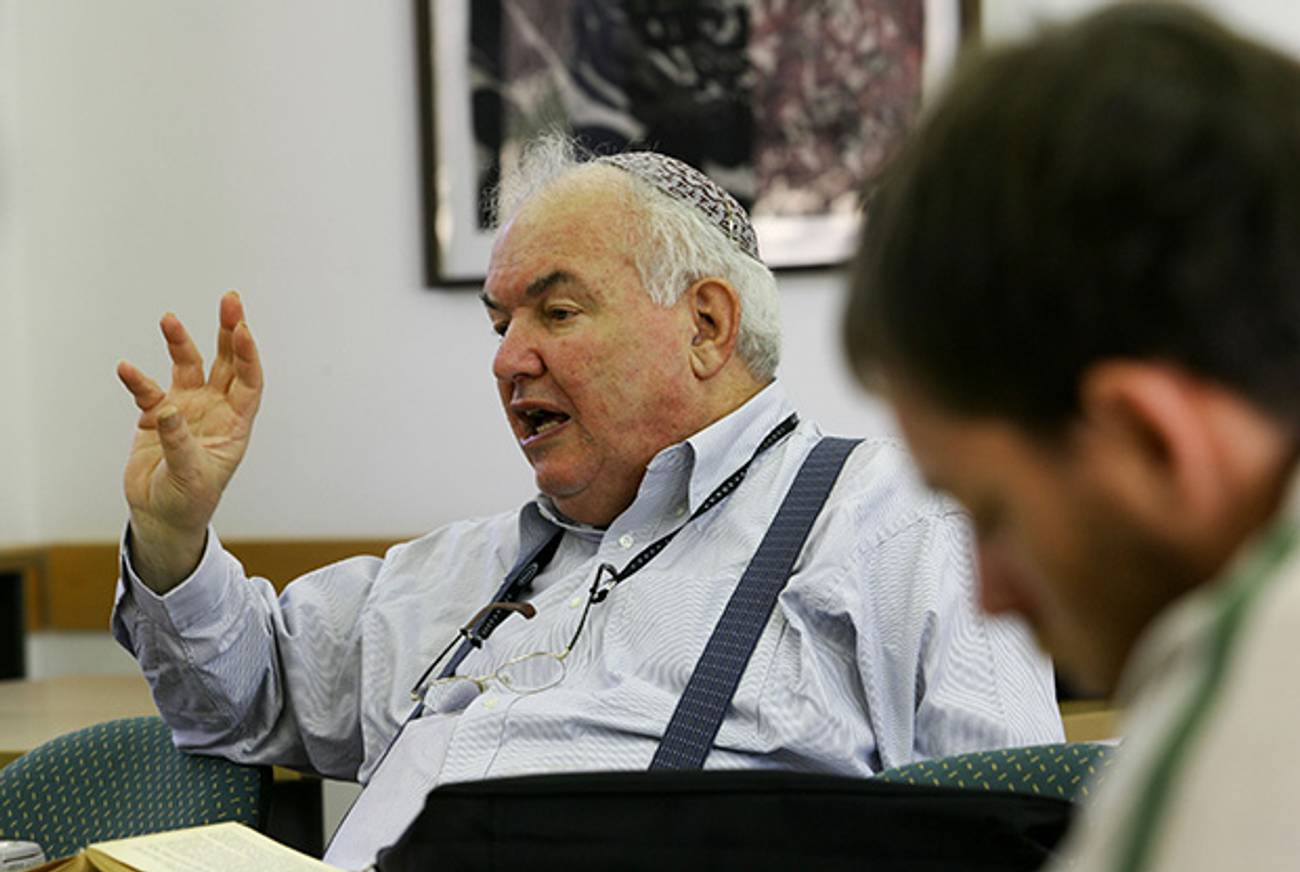The Rabbi Who Hated Lies
David Hartman, my late study partner, wanted to be a great rabbi. He ended up in a war for Judaism’s future.




When he was a yeshiva boy growing up in a poor Hasidic family in the Orthodox enclave of Brownsville, Brooklyn, David Hartman’s consuming spiritual objective was to limit, to the greatest extent possible, the amount of time he spent on anything other than Torah study. His singular dream was to someday join the company of the rabbis he so revered as one of his generation’s leading interpreters of the sacred Jewish canon.
But fate—a deterministic concept at which Hartman, a Maimonides scholar who rose to become one of his generation’s greatest Jewish philosophers, would certainly have scoffed—had other things in mind. His powerful drive to take a role of intellectual leadership among his people remained, but it was channeled into areas like Zionism, pluralism, and ecumenism that were at best foreign concepts, and at worst four-letter words, within the environment of his upbringing. Ultimately, he would go on to smash the idols of his youth while remaining both deeply affectionate—and perpetually enraged—toward ultra-Orthodoxy.
“I was a good yeshiva boy,” he often said, “until I started to read.”
Hartman, who died Sunday morning after a long illness at age 81, came to be regarded as one of the preeminent rabbis and theologians of our time. In the aftermath of the Six Day War, he moved to Israel and built a world-renowned institute named for his father that would teach the value of religious pluralism to thousands, bringing rabbis, priests, and imams (and perhaps more impressively, Orthodox, Conservative, and Reform rabbis) into dialogue with one another. Almost single-handedly, he cleared out a space for a new type of Jewish conversation—one in which the greatest philosophical minds grappled with our traditions—and in the process created a new range of possibilities for how to be Jewish. As he inspired multiple generations of Jewish leaders with the combination of his scholarship and fiercely independent thinking, he perhaps unsurprisingly garnered the condemnation of the Orthodox establishment, who accused him of rebellion and heresy.
In the past few days, Hartman has been remembered for his dynamic classes, his embrace of religious pluralism, his Maimonidean openness, and his vision of Zionism as creating the possibility for a cultural and moral renaissance in the context of a sovereign Jewish state. But I will remember Hartman—whom I had the privilege of working with closely for the last three years of his life—as the person who gave me, a lost yeshiva boy from a very different world than the one he came from, the tools to build a rich, dignified Jewish identity for myself.
***
When I came to work with Hartman three and a half years ago, he was approaching 80 and in the process of transitioning out of a hands-on leadership role as president of the Shalom Hartman Institute, the research and teaching institute he founded in 1976. The institute, with its centrally located Jerusalem campus and its reputation for confronting the intersection between tradition and modernity, was a fixture in the city. I had known it by sight, and reputation, for years. But for most of those years, I myself had been a good Orthodox yeshiva student, and the institute was too liberal for me. So, I’d kept my distance.
Hartman was still delivering his weekly lecture series to a packed house, but he was in the midst of turning over the institutional torch to his son. And after a five-decade-long career in which he had published eight books, he still had a few more things he urgently wanted to get down in print.
If Hartman was a good yeshiva boy until he started to read, I was one until I became a rabbi.
I was also in the midst of a professional transition. I had recently stepped down as the rabbi of an Orthodox synagogue in the East Village. More existentially, though, I had stepped down from being an Orthodox Jew. After eight years spent immersed in the day-night Torah study routine of the yeshiva—a time during which I accepted a high degree of social and intellectual insularity in trade for the possibility of sustained, intensive focus on spiritual growth—I’d gone out into the world of institutional Orthodoxy and found that it bore little resemblance to the Judaism that had nurtured me and that I’d been ordained to teach and share. If Hartman was a good yeshiva boy until he started to read, I was one until I became a rabbi.
For the first time in nearly two decades, I was searching—not only for a new career, but for a new language to describe what it was about Orthodoxy that had ultimately disappointed me and for the right concepts and categories to help me understand the possibilities for what kind of Jew I wanted to be. Through a professional connection, I was approached about working with David as his editor, which would also involve moving to Jerusalem and being his hevruta, or study partner. The job description was that Hartman would bring out books—whether the Talmud, Maimonides, Eric Fromm, or William James—we’d read passages together, and he’d talk out his ideas. I would listen, ask questions, challenge him, and offer alternative ways of formulating things.
“I hope you’ll come, and come quickly,” he said over the phone in 2009, urging me to accept the job with his signature combination of charm, impatience, and Jewish guilt. “We’ve got a lot of important work to do together, and I’m not sure how long I have left.”
***
Three or four days a week I would go over to his apartment on Miriam the Prophetess Street, and we would sit in his office and read and discuss. I would take notes on my laptop, and sometimes, when he got on a roll, I would transcribe what he said more or less verbatim, sometimes for hours on end.
Is there anything more vertigo-inducing than realizing you are never going to hear a certain voice again? Hartman had a big, impatient Brooklyn voice, one that never lost its Yiddish accent or the speech patterns of the Beit Midrash. When I would read over what we’d written out loud to him, if I paused too long after a paragraph he’d jump in: “Aright! Let’s go.”
But like many great personalities, Hartman could be mercurial and insensitive, not always a model of menschiness. Only once did I experience firsthand the signs of the flaring temper about which I had heard rumors. He was frustrated by my inability to understand his explanation of a Talmudic passage. His pitch and volume increased every time he tried to re-explain it, until finally he exploded. “What are you, an idiot?” he demanded to know.
In that explosion I felt I could see David, the young yeshiva-boy, being yelled at by his rebbe and applying himself even harder to grasp the teaching at hand. In a strange way I experienced it as a sign of our increasing closeness. So, I just matter-of-factly asked him, “What are you screaming about?” In response, he paused, thought about it for a beat, smiled, and said: “That’s a very good question.” Which was the best compliment a person could ever receive from David Hartman.
***
There is something very unnerving about going over the notes of a man who will never return to peruse them. Notes are inherently optimistic, premised on an eventual ordering and completion. In their patterns and recurring themes, they also leave a strong imprint of personality.
Looking at the notes I took from our time working together, I find myself struck by how miscast Hartman was as a Jewish rebel. Don’t misunderstand: He relished the role, partly because it proved the stupidity of his detractors. His Orthodox critics never understood that his criticism and creative reinterpretations of the tradition were not offered out of religious spite, or a desire to lead their adherents astray, but to protect Judaism and the Jewish people from them—from Orthodoxy’s corrupting distortions of the tradition, from their claims to exclusive authenticity. He knew the Orthodox leadership’s perpetual constrictions, prohibitions, and negative pronouncements left precious little room for modern Jews to find or create a meaningful Judaism for themselves. In that sense, he saw the Orthodox establishment as robbing the majority of the world’s Jews of access to their birthright.
‘I’m fighting a war,’ Hartman told me, ‘on the monopoly of certain people on truth, on the understanding of what Judaism is.’
“I’m fighting a war,” he told me, “on the monopoly of certain people on truth, on the understanding of what Judaism is.”
Ultimately, his war was over whether “authority”—whose obsessive focus among the Orthodox, particularly haredi fundamentalists he saw as a function of anxiety rather than piety—would be allowed to become the dominant Jewish religious category of the modern era. He felt tortured by the fact that the tradition had become the jurisdiction of fundamentalists, on whom it was mostly lost. He favored a more open-ended approach to religious life in which Jewish practice is treated as an open-ended field of experimentation. “I don’t want order!” I can remember him shouting. “I want vibrancy, passion, people to have a stake in it, lay claim to it, feel it’s theirs, it doesn’t belong to anybody else. There’s plenty of order in a graveyard.”
Still, he did not primarily see himself as a warrior. Throughout my notes, and my memories, he is far more likely to refer to himself as a storyteller, a protective family member. “I often tell people, I bracket the truth question: I’m just going to tell you the story as it comes. Study is a way of telling the story, this is the autobiography of the Jewish people, through the medium of its forms of life. Is it true? I have no idea. I can just tell you that Jews heard the story, and interpreted it in a certain way, to make it their story. The interpretive process was never interested in fact. It was: Can this story tell me something about my life?” Then, more softly, he concluded, “That’s what I mean when I call himself a storyteller.”
“I am a family Jew,” I often heard him say, and this proclamation is repeated throughout my notes over the three years I worked with him. “Unfortunately, my family is disintegrating. … I am a lover who is trying to preserve some remnants of his love.”
Hartman often contrasted his thinking to that of Abraham Joshua Heschel, whose focus on the individual in confrontation with God was in some ways the mirror image of Hartman’s call for collective dignity. “I’m different [from Heschel]: I start with my father singing a niggun, at the Shabbes table, where the family can fight and love, in a living, vibrant place. I want to see my father’s excitement at getting a beautiful esrog. I want to see him feeling dignified even though he was poor, Friday night when my mother served him fish: the head of the fish, to make him feel he was the head of the family. Shabbes turned a poor man into a dignified man who could sing,” he said in one of our sessions.
“The tragedy is that the self-appointed carriers of the music, in between the fish and the soup courses of Shabbes dinner, are carrying stones to throw at passing cars, to build up an appetite for the chicken. And on the way, they are arguing about the halakhic implications of the size of the stones.”
***
Like this article? Sign up for our Daily Digest to get Tablet Magazine’s new content in your inbox each morning.
Charlie Buckholtz is the coauthor, with David Hartman, of The God Who Hates Lies, and senior editor at the Shalom Hartman Institute.
Charlie Buckholtz is the coauthor, with David Hartman, ofThe God Who Hates Lies, and senior editor at the Shalom Hartman Institute.